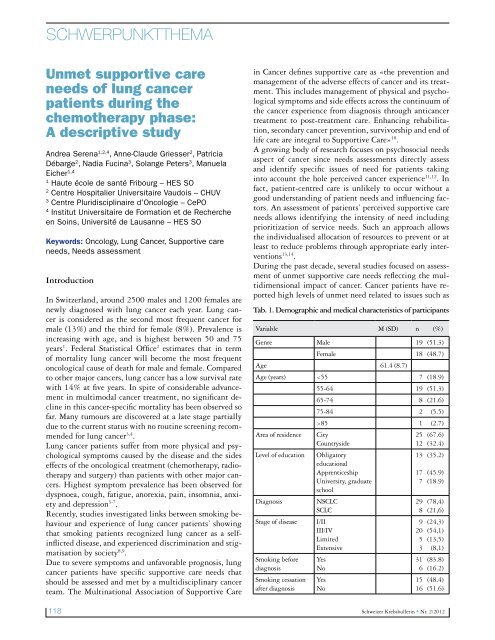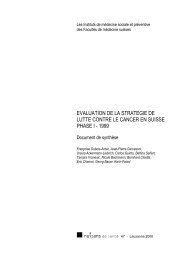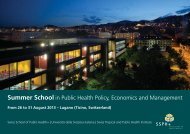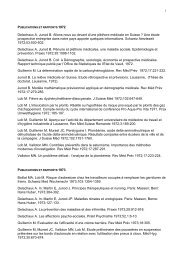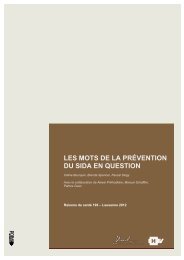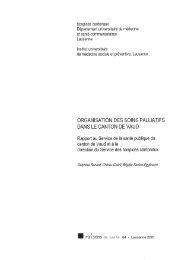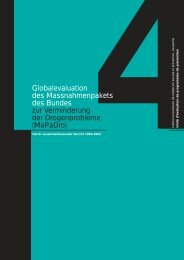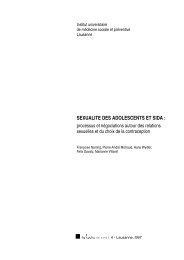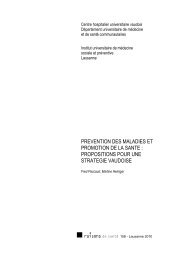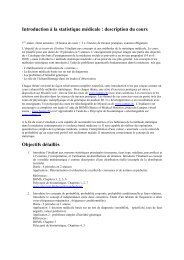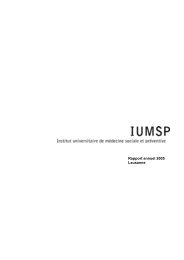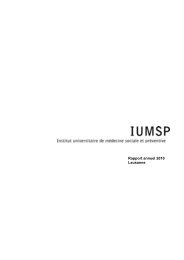Fortbildungen / Formations continues 2012 - IUMSP
Fortbildungen / Formations continues 2012 - IUMSP
Fortbildungen / Formations continues 2012 - IUMSP
Erfolgreiche ePaper selbst erstellen
Machen Sie aus Ihren PDF Publikationen ein blätterbares Flipbook mit unserer einzigartigen Google optimierten e-Paper Software.
SCHWERPUNKTTHEMA<br />
Unmet supportive care<br />
needs of lung cancer<br />
patients during the<br />
chemotherapy phase:<br />
A descriptive study<br />
Andrea Serena 1,2,4 , Anne-Claude Griesser 2 , Patricia<br />
Débarge 2 , Nadia Fucina 3 , Solange Peters 3 , Manuela<br />
Eicher 1,4<br />
1 Haute école de santé Fribourg – HES SO<br />
2 Centre Hospitalier Universitaire Vaudois – CHUV<br />
3 Centre Pluridisciplinaire d’Oncologie – CePO<br />
4 Institut Universitaire de Formation et de Recherche<br />
en Soins, Université de Lausanne – HES SO<br />
Keywords: Oncology, Lung Cancer, Supportive care<br />
needs, Needs assessment<br />
Introduction<br />
In Switzerland, around 2500 males and 1200 females are<br />
newly diagnosed with lung cancer each year. Lung cancer<br />
is considered as the second most frequent cancer for<br />
male (13%) and the third for female (8%). Prevalence is<br />
increasing with age, and is highest between 50 and 75<br />
years 1 . Federal Statistical Of�ce 2 estimates that in term<br />
of mortality lung cancer will become the most frequent<br />
oncological cause of death for male and female. Compared<br />
to other major cancers, lung cancer has a low survival rate<br />
with 14% at �ve years. In spite of considerable advancement<br />
in multimodal cancer treatment, no signi�cant decline<br />
in this cancer-speci�c mortality has been observed so<br />
far. Many tumours are discovered at a late stage partially<br />
due to the current status with no routine screening recommended<br />
for lung cancer 3,4 .<br />
Lung cancer patients suffer from more physical and psychological<br />
symptoms caused by the disease and the sides<br />
effects of the oncological treatment (chemotherapy, radiotherapy<br />
and surgery) than patients with other major cancers.<br />
Highest symptom prevalence has been observed for<br />
dyspnoea, cough, fatigue, anorexia, pain, insomnia, anxiety<br />
and depression 5-7 .<br />
Recently, studies investigated links between smoking behaviour<br />
and experience of lung cancer patients’ showing<br />
that smoking patients recognized lung cancer as a selfin�icted<br />
disease, and experienced discrimination and stigmatisation<br />
by society 8,9 .<br />
Due to severe symptoms and unfavorable prognosis, lung<br />
cancer patients have speci�c supportive care needs that<br />
should be assessed and met by a multidisciplinary cancer<br />
team. The Multinational Association of Supportive Care<br />
in Cancer de�nes supportive care as «the prevention and<br />
management of the adverse effects of cancer and its treatment.<br />
This includes management of physical and psychological<br />
symptoms and side effects across the continuum of<br />
the cancer experience from diagnosis through anticancer<br />
treatment to post-treatment care. Enhancing rehabilitation,<br />
secondary cancer prevention, survivorship and end of<br />
life care are integral to Supportive Care» 10 .<br />
A growing body of research focuses on psychosocial needs<br />
aspect of cancer since needs assessments directly assess<br />
and identify speci�c issues of need for patients taking<br />
into account the hole perceived cancer experience 11,12 . In<br />
fact, patient-centred care is unlikely to occur without a<br />
good understanding of patient needs and in�uencing factors.<br />
An assessment of patients’ perceived supportive care<br />
needs allows identifying the intensity of need including<br />
prioritization of service needs. Such an approach allows<br />
the individualised allocation of resources to prevent or at<br />
least to reduce problems through appropriate early interventions<br />
13,14 .<br />
During the past decade, several studies focused on assessment<br />
of unmet supportive care needs re�ecting the multidimensional<br />
impact of cancer. Cancer patients have reported<br />
high levels of unmet need related to issues such as<br />
Tab. 1. Demographic and medical characteristics of participants<br />
Variable M (SD) n (%)<br />
Genre Male 19 (51.3)<br />
Female 18 (48.7)<br />
Age 61.4 (8.7)<br />
Age (years) 85 1 (2.7)<br />
Area of residence City<br />
25 (67.6)<br />
Countryside<br />
12 (32.4)<br />
Level of education Obligatory<br />
educational<br />
13 (35.2)<br />
Apprenticeship<br />
17 (45.9)<br />
University, graduate<br />
school<br />
7 (18.9)<br />
Diagnosis NSCLC<br />
29 (78,4)<br />
SCLC<br />
8 (21,6)<br />
Stage of disease I/II<br />
9 (24,3)<br />
III/IV<br />
20 (54,1)<br />
Limited<br />
5 (13,5)<br />
Extensive<br />
3 (8,1)<br />
Smoking before Yes<br />
31 (83.8)<br />
diagnosis No<br />
6 (16.2)<br />
Smoking cessation Yes<br />
15 (48.4)<br />
after diagnosis No<br />
16 (51.6)<br />
118 Schweizer Krebsbulletin � Nr. 2/<strong>2012</strong>


